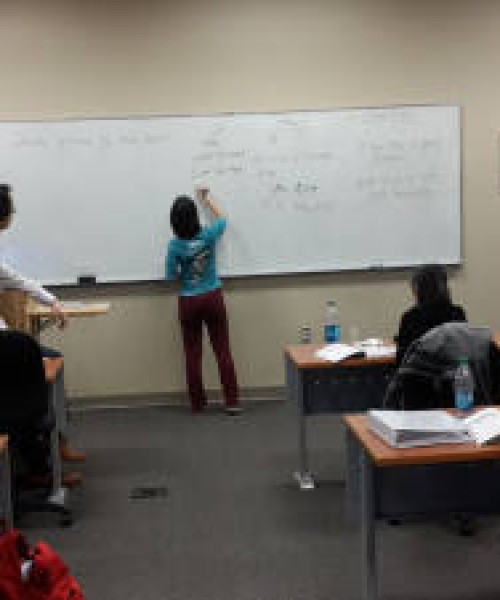Philosophy Essay 代写: 科学的临时性
科学可以区分其不断变化的结论。这种临时的方式,知道可能是非常有问题的,即使它可以对我们有用。科学是由Webster的词典定义为“通过系统的实验和分析获得的知识。”(Webster的英语词典253)真正区别于许多其他方面的科学认识是它有一个非常不同的方式去寻找“真相”。在这种情况下,真理的定义是什么,工程实践中或是对我们有用的因为科学依赖于语用学的理论基础。从学科到学科,找出“真理”的方法不同。然而,即使科学是一个临时的人类活动,它不是唯一的一个。这可以清楚地看到,当一个比较三个不同的领域的研究中的临时结论:科学,数学和艺术。
科学是一个“真理”的系统,通过实验和观察证明。因此,它是一个先验知识,这意味着它是来自经验的知识。虽然有些人会认为,科学是基于太多的假设,而法律总是改变,因此,我们应该使用其他方式的了解,如我们的看法,别人会认为科学带来的用处。在我看来,因为科学总是变化的,它是我们应该欣赏这种认识的主要原因。这些变化表明,即使我们不可能找到所有问题的答案,我们不断在生物、化学等领域的发展,物理等作为认识或知道的方法,涉及的是我们和什么工作在实践中有用的一个务实的做法,科学已经满载,在这个特定的认知方式相关的问题。然而,通过定义它作为一种务实的方式,我们可以看到,科学是关于寻找“真理”,这个“真理”可能不是完美的真理,如Plato所概述的形式与他的想法,但是,这个真理更关心的有用性。在我们的历史上很多次,科学定律和理论进行反驳或改变。例如,有不到一百年前的一个立方体的原子理论,并指出所有的原子都有一个立方体形状的。这个理论很快被许多科学家如玻尔和卢瑟福推翻。今天,我们有一个非常不同的预测,原子看起来像是由于量子力学。随着科学,我们接受我们的限制,我们有今天的工具,我们看看我们可以潜在地与他们做什么。例如,科学家们知道,他们不能达到零度,在理论上,在微观层面的所有动作停止,但实际上这是不可能的因为热传递从一个对象的其他性质。随着科学,我们不停止改进我们的实验方法,即使我们知道我们不能达到完美,但是,今天我们得到接近那些理想的情况下。我们是一个十亿分之一度远离零度标记。科学之所以如此严重,是因为它推动了我们的社会。虽然科学是我们许多问题的答案,它主要是基于预测,这创造了一个两难境地。例如,通过弦理论,我们可以预测,有十一个不同的尺寸,但是,这只是一个有教养的猜测,因为这些尺寸是如此之小,我们永远不会看到他们,我们只能证明他们使用数学。此外,即使这些预测是基于假设,我们仍然可以是相当准确的,即使与我们的局限性,但因为这种准确性是不完美的,我们试图达到最好的,我们可以,因此,科学成为临时。例如,天文学家们能够预测,当下次月食将具有很好的精度,发生,这是因为很多年前科学家证明宇宙的地心模型和采用我们熟悉的今天:日心宇宙模型。因为物理和其他科学是我们探索我们的世界的方式,它使我们从它得到的知识总是有用的。例如,如果一个科学家正试图找到治愈癌症的方法,而是随机地发现一个人的大脑,他还进一步加强了我们对周围一切事物的知识,虽然,科学家希望能找到一个不同的答案。这种有效性重塑我们的知识总是因为它带来了新的思路和模式,试图解释,我们周围的图案。
Philosophy Essay 代写: 科学的临时性
Science can be distinguished for its changing state of conclusions. This provisional way of knowing can be very problematic even though it can be useful to us. Science is defined by the Webster's dictionary as "knowledge gained by systematic experimentation and analysis." (Webster's English Dictionary 253) What really distinguishes the sciences from many of the other ways of knowing is that it has a very different way to find the "truth." The definition of truth in this case is anything that works in practice or is useful to us because science is heavily based on the pragmatic theory. From discipline to discipline the ways of finding out the "truth" differ. However, even though science is a provisional human activity, it is not the only one. This can be seen clearly when one compares three different fields of study in terms of provisional conclusions: science, mathematics and art.
Science is a system where "truth" is proven through experimentation and observation. It is thus a priori knowledge, meaning that it is knowledge that is derived from experience. While some people would argue that science is based on too many assumptions, and the laws always change, therefore, we should use other ways of knowing such as our perception, others would think of the usefulness that science brings. In my opinion, because science always changes, it is the main reason why we should appreciate this way of knowing. These constant changes show that even though we might never find out the answer to everything, we are constantly progressing in fields such as biology, chemistry, physics etc. As a pragmatic way of knowing or a way of knowing that is concerned with what is useful to us or what works in practice, the sciences already come loaded with problems that are associated with this specific way of knowing. However, by defining it as a pragmatic way of knowing, we can see that science is all about finding out the "truth." This "truth" might not be the perfect truth such as outlined by Plato with his idea of forms; however, this truth is more concerned with usefulness. Many times in the course of our history, scientific laws and theories were disproved or changed. For example, there was a cubical atom theory less then one hundred years ago, and it stated that all atoms had a shape of a cube. This theory was soon disproved by many scientists such as Bohr and Rutherford. Today, we have a much different prediction of what the atom looks like thanks to quantum mechanics. With science we accept our limitations that we have with today's instruments, and we look at what we can potentially do with them. For example, scientists know that they can't reach zero Kelvin, where, theoretically, all motion stops on a microscopic level, but practically it is impossible because of the nature of heat transfer from one object to the other. With science we don't stop improving our ways of experimenting even though we know we can't reach perfection; however, today we get close to those ideal situations. We are about a billionth of a degree away from the zero Kelvin mark. Science is so heavily funded for the reason that it advances our society. Although science is the answer to many of our problems, it is based mostly on predictions, and that creates a dilemma. For example, through the string theory we can predict that there are eleven distinct dimensions; however, that is only an educated guess because these dimensions are so small that we will never physically see them, we can only prove them using mathematics. Furthermore, even though these predictions are based on assumptions, we can still be fairly accurate even with our limitations, but because this accuracy is not perfect, we try to achieve the best we can, and, as a result, the sciences become provisional. For example, astronomers can predict where and when the next eclipse will happen with a very good precision, this is because many years ago scientists disproved the geocentric model of the universe and adopted the model we are familiar with today: the heliocentric universe. Because physics and other sciences are the way we explore our world, it makes the knowledge we get from it always useful. For instance, if a scientist is trying to find a cure for cancer, but instead randomly finds out how a person's brain works, he still furthers our knowledge of all the things around us, even though that scientist was hoping to find a different answer. This usefulness always reshapes our knowledge since it brings in new ideas and models that attempt to explain the patterns that are all around us.










